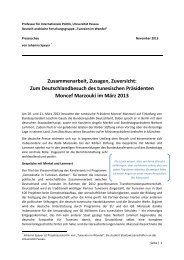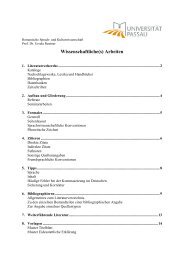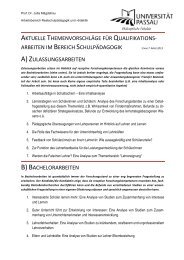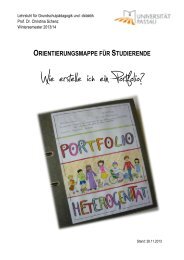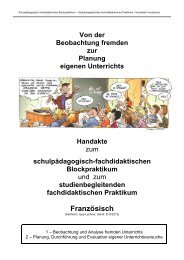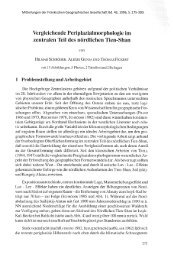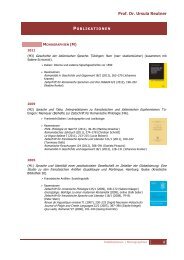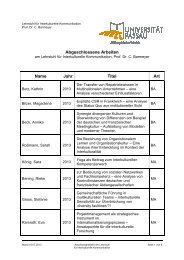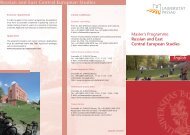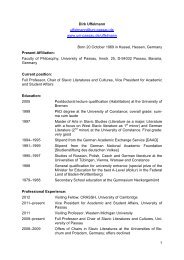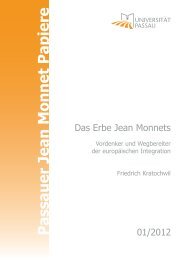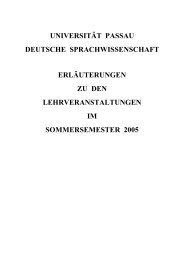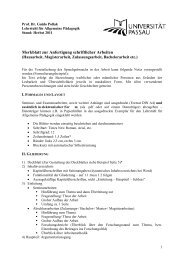The attempt to adopt a mixed-member proportional election system ...
The attempt to adopt a mixed-member proportional election system ...
The attempt to adopt a mixed-member proportional election system ...
Create successful ePaper yourself
Turn your PDF publications into a flip-book with our unique Google optimized e-Paper software.
57<br />
Thai political <strong>system</strong>, we lack empirical data about this element of the operations of<br />
parliament.<br />
38 Later in the meeting, Pairote Promsan nevertheless still argued that an important<br />
element in the drafting of this constitution had been that the drafters had listened <strong>to</strong><br />
the people, and let them participate in the drafting. <strong>The</strong> people wanted a reduction of<br />
the number of MPs <strong>to</strong> about 400 (ibid., p. 117).<br />
39 Section 26 of the Interim Constitution read, “Upon completion of the Draft Constitution,<br />
the Constitution Drafting Committee shall submit an explana<strong>to</strong>ry note detailing<br />
<strong>to</strong> what extent the Draft Constitution differs from the Constitution of the Kingdom of<br />
Thailand B.E. 2540 (1997) as well as the reasons for the amendments…” (Constitution<br />
of the Kingdom of Thailand (Interim). Buddhist Era 2549 [2006]).<br />
40 Some CDC and CDA <strong>member</strong>s felt <strong>to</strong>o restricted by Sawat’s insistence on using the<br />
1997 charter as the model for their 2007 document. For example, Sriracha Charoenphanit<br />
stated that the new constitution had <strong>to</strong> be able <strong>to</strong> improve the country’s political<br />
<strong>system</strong>. <strong>The</strong> CDC had been hampered by the Interim Constitution, which said they<br />
had <strong>to</strong> compare the new draft with the 1997 constitution. This had led many <strong>member</strong>s<br />
<strong>to</strong> assume that the new constitution must be similar <strong>to</strong> the 1997 version. However, all<br />
of them should gather ideas “<strong>to</strong> make this constitution open up new political dimensions.<br />
… I want <strong>to</strong> see change. <strong>The</strong> proposal of ajarn Krirkkiat is one dimension of<br />
change. If we still stick <strong>to</strong> a model that is close <strong>to</strong> that of 1997, then I do not believe<br />
that it can affect change in the <strong>election</strong> <strong>system</strong>” (CDC 38:102). If they did not achieve<br />
change now, Sriracha stressed, there would not be any movement for positive constitutional<br />
changes during the next four <strong>to</strong> eight years. Currently, the climate was quite<br />
good, because four political parties had already been dissolved (this had happened just<br />
a few days before Sriracha’s statement, on May 30, 2007, by the military-appointed<br />
“Constitutional Tribunal,” and by using a special retroactively applied decree of the<br />
coup plotters; the most important dissolution concerned Thaksin’s Thai Rak Thai Party).<br />
<strong>The</strong>refore, “a number of nakkanmueang namnao [foul water politicians] cannot<br />
return [<strong>to</strong> the House].” He only regretted that the Democrat Party had not also been<br />
dissolved, because that way, more “foul water politicians” would have been removed<br />
from the Thai political <strong>system</strong> (ibid.:103). Sriracha, one of the more extremist <strong>member</strong>s<br />
on the CDC, was a retired lecturer of the faculty of law at Sukhothai Thammathirat<br />
University, and secretary general of the office of the Parliamentary Ombudsmen.<br />
In addition, he was a committee <strong>member</strong> at the Council of State and at the National<br />
Research Council. This nicely reflected the aphichon’s network nature, as did the fact<br />
that, after having served on the CDC, Sriracha was selected <strong>to</strong> be an Ombudsman.<br />
Like Komsan Pokhong, Sriracha was amongst a group of 96 royalist academics that,<br />
during the PAD protests in early 2006, petitioned the king on March 4 <strong>to</strong> replace<br />
Prime Minister Thaksin Shinawatra by an interim premier (<strong>The</strong> Nation, March 5,<br />
2006).<br />
41 In a contribution <strong>to</strong> the debate, Watchara Hongpraphatson referred <strong>to</strong> a paper of<br />
twenty pages written by Krirkkiat about the <strong>election</strong> <strong>system</strong>. Unfortunately, I do not<br />
have this document (though I will try <strong>to</strong> acquire it). Given that he had read the paper,<br />
and considering the additional statements made by Krirkkiat in this meeting, it was<br />
surprising <strong>to</strong> read Watchara’s closing statement, “I would like <strong>to</strong> ask where is the difference<br />
between your proposal and the model in the 1997 constitution” (CDC 38:108).



